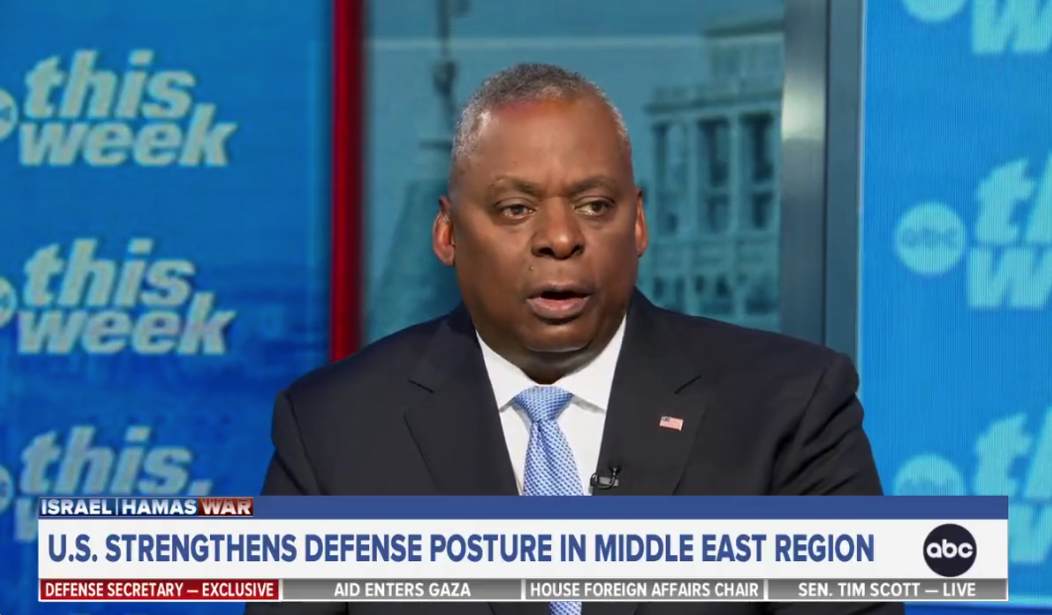SecDef: Concern About Potential Escalation Prompts Ramping Up of US Presence in Mid East
U.S. Secretary of Defense Lloyd Austin appeared with Jonathan Karl on "ABC News This Week" Sunday morning to discuss the Israel-Hamas War and the stepped-up presence of the U.S. military in the region.
Since Hamas' Oct. 7 attacks on Israel, the U.S. has doubled its presence in the Middle East, sending the Dwight D. Eisenhower carrier strike group to join the Gerald. R. Ford strike group in the eastern Mediterranean, as well as doubling the number of F-16, A-10, and F-15E squadrons in the region. Additionally, the Pentagon has issued "Prepare to Deploy" orders to 2,000 troops.
Amid these moves, U.S. forces have come under attack, with Ain al-Asad Air Base being targeted by drones and rockets Thursday evening. Additionally, the USS Carney, part of the Ford carrier strike group, shot down missiles fired by Iran-backed terrorists operating in Yemen on Wednesday night. As streiff explained regarding that incident:
The Carney was not under attack. It was in the area of the Houthi missile launch, serendipitously or not so much, and engaged outbound Houthi missiles. In theory, the missiles could have been headed toward Israel. Realistically, they were probably heading in the direction of Saudi Arabia. This was the first time a US warship has engaged a Houthi cruise missile.
Austin told Karl on Sunday that the U.S. was strengthening its defense posture in the region over concern about “prospect of a significant escalation of attacks on our troops and our people throughout the region.”
From their exchange:
KARL: I want to start with those moves you announced late yesterday, last night. You've got the USS Eisenhower going to the Persian Gulf, you've got more missile defense systems headed to the region, troops put on standby — what's behind these moves?
AUSTIN: Well, Jonathan, as you know, recently, we've seen rocket and UAV attacks against bases housing our troops in Iraq and Syria. We're concerned about potential escalation. In fact, what we're seeing is a...prospect of a significant escalation of attacks on our troops and our people throughout the region. And because of that, we're going to do what's necessary to make sure that our troops are in...a good position, they're protected, and that we have the ability to respond.
Now, this additional deployment sends another message to those who...would seek to widen this conflict. As President Biden said earlier, and as you've heard me say, if any group or any country is looking to widen this conflict and take advantage of this very unfortunate situation that we see, our advice is: "Don't." We maintain the right to defend ourselves. And we won't hesitate to take the appropriate action.
Karl asked Austin about the Carney's missile shootdown Thursday evening, and Austin applauded the Carney's efforts and reaffirmed the authority of U.S. forces to
More from their exchange:
KARL: In fact, we saw the USS Carney take down those three Houthi missiles — Houthis, again, that's an Iranian-backed group in Yemen — and also several drones. Was that takedown defending our ships in the region? Or was it defending Israel?
AUSTIN: Jonathan, when you have cruise missiles heading towards one of our DDGs — one of our destroyers — that vessel's gonna do what it needs to do to protect itself. The same applies for the UAVs. And I applaud the work of the crew of the Carney. They demonstrated...what our very capable United States Navy can do and will do if challenged.
KARL: And you've given them the authority to do that? That was done in an instant.
AUSTIN: They have the inherent right for self-protection there, Jon, yeah.
In addition to the carrier strike groups Austin announced Saturday that:
I have also activated the deployment of a Terminal High Altitude Area Defense (THAAD) battery as well as additional Patriot battalions to locations throughout the region to increase force protection for U.S. forces.
Finally, I have placed an additional number of forces on prepare to deploy orders as part of prudent contingency planning, to increase their readiness and ability to quickly respond as required.
I will continue to assess our force posture requirements in the region and consider deploying additional capabilities as necessary.





Post a Comment